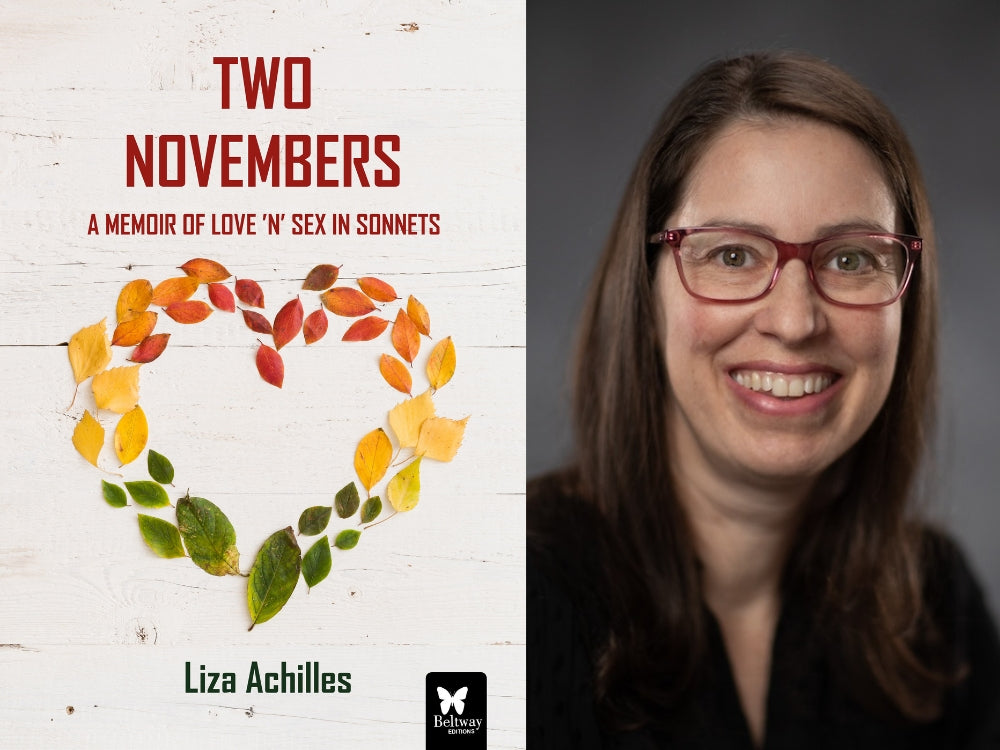An interview with author Liza Achilles

Liza Achilles has been a friend of Silent Book Club for many years. She is one of our original chapter organizers, running the SBC Rockville chapter since 2017, and she's been a guest contributor on the blog. Liza is publishing a new book on July 1, and we were delighted to interview her about it here!
You can preorder a copy of her book, Two Novembers: A Memoir of Love 'n' Sex in Sonnets on Bookshop.org
Two Novembers starts out as a love letter to the physical therapist who helped you recover from a computer overuse injury. What was it about that experience that inspired you to write Shakespearean sonnets?
If I had fallen in love with someone else, I could have told my closest friends. But it's taboo and clichéd to fall in love with your physical therapist. I didn't know how to tell anyone without sounding unhinged. And yet I had powerful feelings that I didn't know what to do with.
One day, I secretly wrote my love interest a poem. I had been a longtime admirer of Shakespeare, especially his love sonnets, and so I wrote a sonnet.
That first sonnet was so fun and cathartic to write that I wrote another one the next day, and then another. Soon, I realized that this was a once-in-a-lifetime opportunity to write a sonnet sequence about real-life feelings of passionate love. I decided to keep writing sonnets as my love life changed over the course of a year.
You've written that this book "carries the beauty and drama of an ancient poetic style into the twenty-first century." How did you adapt the Shakespearean sonnet for modern readers?
A lot of people think of Shakespearean sonnets as being old and stuffy. Indeed they are to most modern readers, who are not used to the antiquated language. But during Shakespeare's lifetime, the language of his sonnets was the language everyday people spoke.
To bring Shakespeare's sonnets into modern times, I used modern language that's easily understandable to modern people. And I wrote about topics from my twenty-first-century life, such as taking antidepressants and scrolling through Twitter.
What makes the artform resonate for you?
The Shakespearean sonnet sequence has a specific rhythm and rhyme scheme. This makes it similar to modern popular music. Also, my sonnet sequence tells a true story with a complete narrative arc. This makes it similar to a modern prose memoir.
I am drawn to the Shakespearean sonnet sequence for the same reasons that I am drawn to popular music and memoir. I also love the rhyming couplet at the end of each poem. This offers the opportunity to insert a joke or twist at the end. I am drawn to the Shakespearean sonnet for the same reasons that I am drawn to comedy and wit.
You started SBC Rockville way back in 2017, and your chapter is one of our longest running groups, even surviving the pandemic. How has your experience hosting Silent Book Club changed over the years?
It started out as a way to meet new friends after my divorce and also socially embrace my bookishness. The club was successful, and I was overjoyed to meet so many other readers who loved the idea of Silent Book Club. I met most of my closest friends there, some of whom were regulars, and some of whom came just once or twice. Later, we expanded to a second location, which was less successful, possibly due to the venue, location, and day of the week.
Then I got a concussion. The pandemic began a few months later. We disbanded for a while but resumed meetings on Zoom. An enthusiastic new member volunteered to be a co-organizer and lead Zoom events when I wasn't able to because of my concussion symptoms. Some of us visited Silent Book Clubs elsewhere in the world on Zoom, and members of other groups visited us. I made some dear friends who I've still never met in person, but who I'm still in touch with today.
I fully recovered from my concussion, and the chronic pain I developed as a result of my concussion, in mid-2023. Around that time, I restarted Silent Book Club in person. Attendance was low because society was still emerging from the pandemic.
At the end of 2023 and the beginning of 2024, Silent Book Club went viral on social media, and our numbers skyrocketed. I had to restrict the number of attendees because the restaurant could only accommodate so many. Eventually, the restaurant and I made the hard decision to part ways. We're now meeting at another restaurant that can better accommodate large numbers.
As a veteran organizer, what advice would give to newer hosts, or someone who was considering starting their own Silent Book Club?
This brings us back to the topic of my physical therapist. One thing that attracted me to him was his expertise in making people feel at ease during therapy. He greeted each patient kindly when they appeared, and he made sure to wish each patient a wonderful day as they were leaving. During therapy, he would crack jokes that made people laugh, and these were always friendly, open-hearted jokes that included everyone, never snarky or bitter jokes.
When I started Silent Book Club of Rockville, I tried to be like him, or anyway a female version of him. To my astonishment, it worked. I would recommend this to all leaders: make each and every person feel welcome. Greet them when they walk in, make friendly jokes to help them feel comfortable, and tell them you look forward to seeing them again as they are leaving.
This technique is especially useful for Silent Book Club because many attendees are introverts who are nervous when they come for the first time. They like to be welcomed, to be asked what they are reading, to laugh at friendly jokes, and to be invited back.
Do you think Silent Book Club has influenced you as a reader and now a writer?
Joining Silent Book Club helped me embrace my love of reading in a social sphere. For so many years, I held my reading close to myself, like an embarrassing secret. Now I flaunt it and spread it widely. And now I have a wide circle of friends who are book lovers like me. It's the best feeling to be in a community of people who love the same activity you do. This influences me as a reader and a writer, because every day when I sit down to read or write, I'm doing something that's acceptable and admired within my community.
Also, I love seeing what other club members are reading and discussing books with them. This helps me decide what to read next. It also helps me understand what topics are trending among book readers, which is useful information as I write my blog for the discerning reader (lizaachilles.com).
What are your hopes and dreams for the future of this community?
My hope and dream is to never have to tell anyone again what a Silent Book Club is. I want it to be such a part of our culture that everyone already knows.

